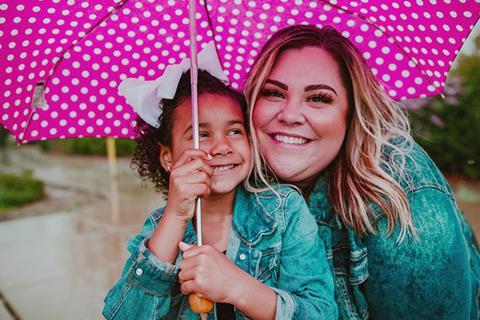Ali Hull talks to two Christian foster carers about their very different experiences of fostering

The need for foster parents has never been greater, to take children into your home, perhaps overnight, perhaps for years, and to provide them with love and support, despite what can be very challenging behaviour. The John Lewis Christmas advert was well received by many in the fostering community and with more than 9,000 needed UK wide it is to be hoped that many might be stirred to investigate the option. We spoke to Vicky and Clare about their experiences. Both are Christians: both have been fostering for many years, and both are positive – with caveats.
Vicky was really moved to take action after seeing a video on child protection. “I had never seen anything like this before and desperately wanted to ‘save’ children from these horrors. We have now been fostering (the same family) for over 14 years. It’s been a privilege (honestly!) to see the boys I look after grow into sensitive, kind young men. We are really proud of them and their achievements.”
But it hasn’t been plain sailing. One child had to leave, after a “serious incident” left Vicky and her husband “feeling we could not confidently keep him (or the rest of us and those around us) safe.” And they have also encountered a lot of suspicion of their faith. “We were, for a number of years, treated with great suspicion and mistrust, and subject to intense scrutiny, much more so than other foster carers. The children were always asked about church, and whether or not they liked going, at each of their reviews.”
How does she feel generally about social services? “As an organisation, our local social services are poorly managed. Yes, there is (apparently) no money, yes, they are short-staffed, but these traumatised children deserve better. Some, probably most, social workers are amazing, often going way above and beyond their duty. We have had some fantastic support at times. Unfortunately, this is often not reflected at management level, and the lack of support for their staff is immensely frustrating, for both the social worker involved and ourselves.”
Not for the faint hearted
And her advice for any Christians thinking about fostering? “Not for the fainthearted! When I started fostering, I thought, as I was a Christian, I would be able to give a child lots of love and ‘fix’ them, give them a ‘normal’ life. Silly me! Life is never normal for a child who has been neglected and/or abused by the people they are meant to trust. That is not normal. Yes, they can learn to deal with their experiences, and yes, they can recover from their ordeal, but they need lots of love, support, patience and acceptance. That’s easy to say, it rolls off the tongue, but it’s exhausting! Mentally, physically and, yes, spiritually draining. Make sure you have people praying for you!”
Clare, who has been fostering for eleven years, also stresses the vital role that can be played by a church, in supporting foster parents. “We are part of a very supportive church family and they have trained all the children’s group workers in trauma-informed practice, which has really helped the children that we care for to feel welcomed and understood within a church setting. Some of the concepts that we talk about in church, such as the fact that we have a loving father, or that we are part of a caring family of God, can be very difficult for our children to understand as this is not their reality of fathers and family, and so we have had to think as a church about these subjects and the ways in which we broach them.”
Different from caring for my own
After bringing up their own family, Clare and her husband began fostering small children, all on short-term placements. What made her want to foster? “I loved being a mum and wanted to carry on staying at home looking after little children for as long as possible. I now realise that caring for children who have been abused and traumatised is very different from caring for my own children. Loving the children is one of the highlights of the job, although on some days, when they are screaming, shouting obscenities and throwing things around your house, it can be very tough. We always have to keep in mind that although we don’t accept or love the behaviour, we always accept the child, and we love them. Because of the age range of children we foster, they will all leave us, either to go home or to be adopted, and, although it may sound strange, this is usually a highlight: we are either seeing families reunited and restored, or we are watching a family being created. We don’t say ‘goodbye’ to the children who leave our home, but rather ‘see you soon’ as we know how important it is for the children and their self-worth, their sense of identity, their self-esteem, to continue to see us, and it is such a highlight to see them grow over the years and to flourish with their family.”
As a couple, they have had to grow, learn and adapt. “If you have seen this year’s John Lewis advert, I can assure you that we haven’t yet learnt to skateboard! However, we have learnt Makaton to help a child who was struggling with communication, we have learnt how to look after afro hair, we have spent time finding what every child likes to eat, and cooking those meals, we have taught children to ride scooters on the skateboard ramps, and spent hours learning the theme tune to Paw Patrol! Seeing the children change over their time with us is wonderful, but in the same way, we have seen families change too. One of our most abiding memories came early on in our fostering journey when we sat down for lunch with an ex-drug addict who had battled hard to be reunited with her child.”
It has not all been easy, particularly, she says, “when we don’t agree with a plan that has been made for a child, when we feel that we are not being listened to, that nobody values the opinions we have… feeling like we are being seen as just a bed for the night rather than being treated as a valuable part of the professional team around the child.”
But their experience of social services is far more positive than Vicky’s: “We can honestly say that we have had no problems from children’s social care or from individual social workers because we are Christians. Whenever a child comes to live with us, we will check with the social worker that we can take the child to church and the response has always been positive.”
Social services ‘in crisis’
However, she does feel that social services are in crisis: “The foundations are crumbling and therefore the whole structure is in danger of falling apart. There are not enough children’s social workers and so the ones we have got are stretched beyond capacity. They have too many children on their books and not enough time to help families, to support them or to put the children at the centre of everything they do and every decision that is made. The emphasis is, too much, on paperwork and not enough on getting to know the children. They all came into the profession to help but along the way the paper trail has taken away their time. Social workers, and the system they work for, need our prayers.”
And her advice for Christians considering fostering? “It is important to think about the support network around you, to think about whether the church can support the work you are doing and the children who will come to live in your home. It is also vital to think about your thoughts and feelings on taking children from different backgrounds, or young people who are questioning their sexuality etc. It is critical we don’t add to the trauma the child has already experienced.”































